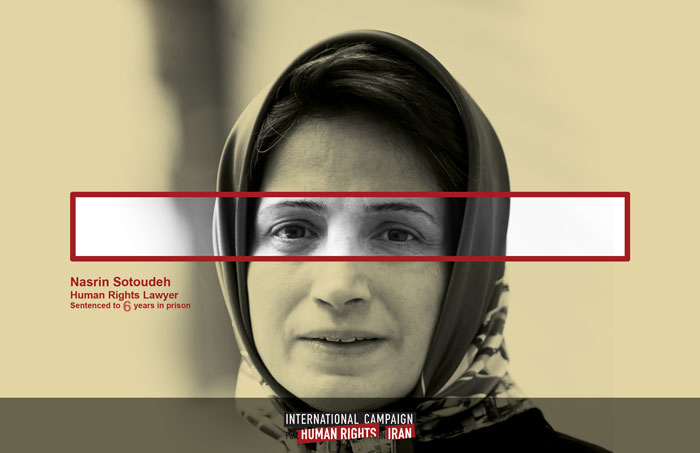Nasrin Sotoudeh in Solitary Confinement, 18 Months Without a Phone Call

In recent days, there have been some reports that Nasrin Sotoudeh had disappeared. Khandan explained that she has not disappeared, but that various Iranian authorities have been renouncing their responsibility for her case. While Evin Prison is operated by Iran’s Prisons Organization, under the Iranian Judiciary, Ward 209 is operated by the Intelligence Ministry, whose minister answers directly to the Supreme Leader.
Reza Khandan, the husband of prominent human rights lawyer and prisoner of conscience Nasrin Sotoudeh, told the International Campaign for Human Rights in Iran that she is currently spending 20 days in solitary confinement, expected to end Wednesday. The human rights lawyer is being held in Ward 209 of Evin Prison, he said.
“When Nasrin launched her hunger strike, our visiting days had been confirmed for Sundays, along with the other women prisoners of conscience. As she is in solitary confinement, though, they say she is banned from having visitors,” Khandan told the Campaign. “But that is totally irrelevant—these 20 days of solitary confinement are going to be completed in the next three days, and she is supposed to be transferred to general ward. The problem is, she has not had a phone call for 18 months, and we have not been informed about her transfer to the general ward this week. Our first official visit [since her solitary confinement] was going to be next Sunday, but it has been canceled due to A’shura [a religious public holiday].”
In recent days, there have been some reports that Nasrin Sotoudeh had disappeared. Khandan explained that she has not disappeared, but that various Iranian authorities have been renouncing their responsibility for her case. While Evin Prison is operated by Iran’s Prisons Organization, under the Iranian Judiciary, Ward 209 is operated by the Intelligence Ministry, whose minister answers directly to the Supreme Leader.
“Nasrin is in Ward 209. The Ward 209 authorities say that she is there but they take no responsibility. On the other hand, Evin officials say that they abdicated authority [to Ward 209]. So I mentioned once that Nasrin is judicially disappearing, and it led to a misunderstanding. I have had an advance warning here: these authorities renouncing responsibility shows that if anything happens to her, they will abdicate any responsibility for that,” Khandan told the Campaign.
Discussing the denial of visitations, Khandan said, “According to the law, she is not banned from visits now, but these internal political games in Evin have deprived her of weekly visits. There was one 10-minute visit that was granted to our children in an office building away from the regular meeting hall because the Tehran Prosecutor was going to give an interview the following day. A reporter was supposed to ask a question regarding visiting Nasrin, and this way the Prosecutor had a response.”
Nasrin Sotoudeh, a lawyer and human rights activist, is one of the female prisoners at Evin Prison who launched a hunger strike to protest her conditions on October 17, 2012. In response, she was been transferred to solitary confinement on October 31, and her concerned have gone unanswered. Sotoudeh was originally arrested on September 4, 2010, and sentenced to 11 years in prison, 20 years barred from practicing law, and 20 years barred from leaving Iran. An appeals court later reduced Sotoudeh’s prison sentence to 6 years and her ban from practicing law to 10 years.
Regarding his wife’s condition, Khandan told the Campaign, “There are no facilities in solitary confinement. She was just given a book, her eyeglasses, and a heating pad. She is currently living in a cell with three walls and a door and those items I just listed. I hope she will be transferred to the general ward as soon as possible, in order to have better treatment. Our children managed to visit her for a few minutes on November 12, but they are not able to give us a proper picture of their mother’s condition; they just told us that she was underweight. We don’t know how much she has deteriorated, and I’m afraid Nasrin’s other close relatives were not allowed to meet her.”






